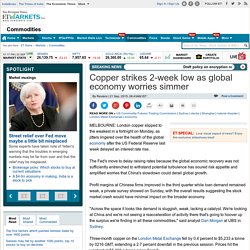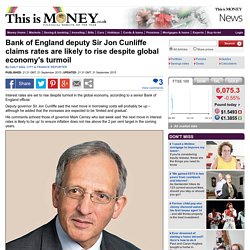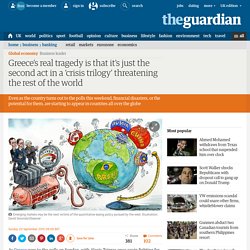

Copper strikes 2-week low as global economy worries simmer. MELBOURNE: London copper slipped to the weakest in a fortnight on Monday, as jitters lingered over the health of the global economy after the US Federal Reserve last week delayed an interest rate rise.

The Fed's move to delay raising rates because the global economic recovery was not sufficiently entrenched to withstand potential turbulence has soured risk appetite and amplified worries that China's slowdown could derail global growth. Profit margins at Chinese firms improved in the third quarter while loan demand remained weak, a private survey showed on Sunday, with the overall results suggesting the stock market crash would have minimal impact on the broader economy. "Across the space it looks like demand is sluggish, weak, lacking a catalyst.
We're looking at China and we're not seeing a reacceleration of activity there that's going to hoover up the surplus we're finding in all these commodities," said analyst Dan Morgan at UBS in Sydney. Oil plunges 3.5% as US warns on health of global economy. Bank of England deputy Sir Jon Cunliffe claims rates are likely to rise despite global economy's turmoil. By Daily Mail City & Finance Reporter Published: 21:31 GMT, 21 September 2015 | Updated: 21:31 GMT, 21 September 2015 Interest rates are set to rise despite turmoil in the global economy, according to a senior Bank of England official.

Deputy governor Sir Jon Cunliffe said the next move in borrowing costs will probably be up – although he added that the increases are expected to be ‘limited and gradual’. His comments echoed those of governor Mark Carney who last week said ‘the next move in interest rates is likely to be up’ to ensure inflation does not rise above the 2 per cent target in the coming years. Interest rates: Deputy governor Sir Jon Cunliffe said the next move in borrowing costs will probably be up But the views of Carney and Cunliffe are at odds with those expressed by the central bank’s chief economist Andy Haldane who last week said rates may need to be slashed once again.
European Stocks Tumble on Fed's Downbeat Assessment of Global Economy. LONDON ( TheDeal) -- After a mixed start, gloom descend on European markets Friday morning as investors, spooked by the Federal Reserve's downbeat assessment of the global economy, took a glass-half-empty view of its decision to stand pat on rates.

Perpetuating months of uncertainty the Federal Open Market Committee cited "global economic and financial developments" as its reason for delaying the first rate rise in almost a decade. Fed Chief Janet Yellen warned that a surprisingly "abrupt" slowdown in China may hurt U.S. growth. "As these conditions could persist, it raises reasonable questions about whether they will be able to move this year," noted UBS economists, who have now cut their rate expectations from 150 basis-points of rises in the current cycle to 100 basis points, in increments of 25 basis points at every other Fed meeting next year.
STOCKS TO BUY: TheStreet's Stocks Under $10 has identified a handful of stocks with serious upside potential. See them FREE for 14-days. Greece’s real tragedy is that it’s just the second act in a ‘crisis trilogy’ threatening the rest of the world. As Greece goes to the polls on Sunday, with Alexis Tsipras once again fighting for his political life, all eyes will be on the recession-scarred nation and the fragile truce it has struck with its eurozone creditors.

Whatever the outcome, fresh spending cuts and further economic misery look unavoidable. But Greece’s tragedy, which is far from over, is playing out against the background of a simmering crisis in the global economy. Indeed, if the Bank of England’s chief economist, Andy Haldane, is worth listening to – which he almost invariably is – Greece’s travails are merely one part of the long-running financial and economic crisis that has rippled around the world since the US investment bank Lehman Brothers collapsed seven years ago. On this analysis, the Federal Reserve’s decision to delay its long-planned interest rate rise last Thursday is another part of the same unsettling picture. Indeed, Haldane believes the Bank may have to do more than that.
Some people never learn.